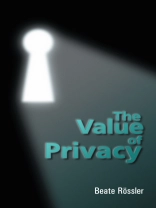This new book by Beate Rössler is a work of real quality and originality on an extremely topical issue: the issue of privacy and the relations between the private and the public.
Rössler investigates the reasons why we value privacy and why we ought to value it. In the context of modern, liberal societies, Rössler develops a theory of the private which links privacy and autonomy in a constitutive way: privacy is a necessary condition to lead an autonomous life. The book develops a theory of freedom and autonomy which sees the ability to pose the “practical question” of how one wants to live, of what a person strives to be, at the centre of the modern idea of autonomy.
The question of privacy is emerging as an increasingly important topic in social and political theory and is central to many current debates in law, the media and politics. The Value of Privacy will be widely recognised to be a classic contribution to the subject.
Зміст
Foreword.
I. Introduction.
1. Discourses on privacy.
2. Privacy: conceptual clarifications.
3. The framework of liberal democracy.
4. Cultural differences: autonomy and authenticity.
5. A comment on the method.
6. Privacy and autonomy: the line of argument.
II. Equal Freedom, Equal Privacy.
On the Critique of the Liberal Tradition.
1. Head or heart: contradictions in the liberal concept of privacy.
2. The feminist critique.
3. Three classics of liberal thought: Locke, Mill and Rawls.
4. Equality and difference between the sexes.
Parenthesis: On the debate over equality and difference.
5. Equal freedom, equal privacy.
III. Freedom, Privacy and Autonomy.
1. Introduction.
2. A general concept of freedom.
3. Freedom and autonomy.
Authenticity and identification.
Parenthesis: On the concept of authenticity.
The genesis of desires and autonomy as habitus.
Goals and projects.
4. Why do we value privacy?.
5. Privacy and autonomy.
IV. The Three Dimensions of Privacy.
1. Decisional privacy: scope for action and decisions.
1.1. Private matters and freedom for decisions.
Parenthesis: abortion and the right to decisional privacy (Roe vs. Wade).
1.2. Decisional privacy and autonomy (1): the communitarian critique.
1.3. Decisional privacy and autonomy (2): the feminist critique.
1.4. What sort of freedom is protected by privacy?.
2. Informational privacy: limits to knowledge.
2.1. Expectations: what do other people know about me?.
2.2. Informational privacy and unspecified others: the Panopticon.
2.3. Informational privacy and specified others: collusions, friendships and intimate relations.
2.4. Expectations, knowledge, autonomy.
3. Local privacy: the private home.
3.1. The refuge of privacy.
3.2. A room of one’s own: self-invention, self-presentation and autonomy.
3.3. Privacy and the family: love and justice.
V. Interfaces: Public and Private.
1. Interfaces and ambivalences.
2. Exposure: the staging of privacy in the public realm.
3. Concealment: the protection of the public realm from private matters.
4. The private and the public person: dissonant identities
Про автора
Beate Rössler is Associate Professor of Philosophy, University of Amsterdam.












